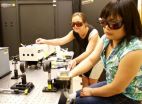(Press-News.org) Unlocking the secrets to better treating the pernicious disorders of obesity and dementia reside in the brain, according to a paper from American University's Center for Behavioral Neuroscience. In the paper, researchers make the case for treating obesity with therapies aimed at areas of the brain responsible for memory and learning. Furthermore, treatments that focus on the hippocampus could play a role in reducing certain dementias.
"In the struggle to treat these diseases, therapies and preventive measures often fall short. This is a new way for providers who treat people with weight problems and for researchers who study dementias to think about obesity and cognitive decline," said Prof. Terry Davidson, center director and lead study author.
In the paper, published in the journal Physiology & Behavior, Davidson and colleague Ashley A. Martin review research findings linking obesity with cognitive decline, including the center's findings about the "vicious cycle" model, which explains how weight-challenged individuals who suffer from particular kinds of cognitive impairment are more susceptible to overeating.
Obesity, Memory Deficits and Lasting Effects
It is widely accepted that overconsumption of dietary fats, sugar and sweeteners can cause obesity. These types of dietary factors are also linked to cognitive dysfunction. Foods that are risk factors for cognitive impairment (i.e., foods high in saturated fats and simple carbohydrates that make up the modern Western diet) are so widespread and readily available in today's food environment, their consumption is all but encouraged, Davidson said.
Across age groups, evidence reveals links between excess food intake, body weight and cognitive dysfunction. Childhood obesity and consumption of the Western diet can have lasting effects, as seen through the normal aging process, cognitive deficits and brain pathologies. Several analyses of cases of mild cognitive impairment progressing to full-blown cases of Alzheimer's disease show that the first signs of brain disease can occur at least 50 years prior to the emergence of serious cognitive dysfunction. These signs originate in the hippocampus, the area of the brain where memory, learning, decision making, behavior control and other cognitive functions come into play.
Still, most research on the role of the brain in obesity focuses on areas thought to be involved with hunger motivation (e.g., hypothalamus), taste (e.g., brain stem), reinforcement (e.g., striatum) and reward (e.g., nucleus accumbens) or with hormonal or metabolic disorders. This research has not yet been successful in generating therapies that are effective in treating or preventing obesity, Davidson says.
Vicious Cycle
Experiments in rats by Davidson and colleagues show that overconsumption of the Western diet can damage or change the blood-brain barrier, the tight network of blood vessels protecting the brain and substrates for cognition. Certain kinds of dementias are known to arise from the breakdown in these brain substrates.
"Breakdown in the blood-brain barrier is more rationale for treating obesity as a learning and memory disorder," Davidson said. "Treating obesity successfully may also reduce the incidence of dementias, because the deterioration in the brain is often produced by the same diets that promote obesity."
The "vicious cycle" model AU researchers put forth says eating a Western diet high in saturated fats, sugar and simple carbohydrates produces pathologies in brain structures and circuits, ultimately changing brain pathways and disrupting cognitive abilities.
It works like this: People become less able to resist temptation when they encounter environmental cues (e.g., food itself or the sight of McDonald's Golden Arches) that remind them of the pleasures of consumption. They then eat more of the same type of foods that produce the pathological changes in the brain, leading to progressive deterioration in those areas and impairments in cognitive processes important for providing control over one's thoughts and behaviors. These cognitive impairments can weaken a person's ability to resist thinking about food, making them more easily distracted by food cues in the environment and more susceptible to overeating and weight gain.
"People have known at least since the time of Hippocrates that one key to a healthy life is to eat in moderation. Yet many of us are unable to follow that good advice," Davidson said. "Our work suggests that new therapeutic interventions that target brain regions involved with learning and memory may lead to success in controlling both the urge to eat, as well as the undesirable consequences produced by overeating."
INFORMATION:
American University is a leader in global education, enrolling a diverse student body from throughout the United States and nearly 140 countries. Located in Washington, D.C., the university provides opportunities for academic excellence, public service, and internships in the nation's capital and around the world. The Center for Behavioral Neuroscience creates a unique interdisciplinary research and training environment that promotes excellence in the study of brain function and its manifestation in behavior.
Targeting the brain to treat obesity
Focus therapies on areas of memory and learning, AU researchers say
2014-07-23
ELSE PRESS RELEASES FROM THIS DATE:
UNC researchers find unsuspected characteristics of new CF drugs, offering potential paths to more effective therapies
2014-07-23
In lab experiments using tissue samples cultured from cystic fibrosis patients, scientists at the UNC School of Medicine and the UNC Marsico Lung Institute have shown that a new CF drug counteracts the intended beneficial molecular effect of another CF drug.
The finding, published today in the journal Science Translational Medicine, shows how a mutant CFTR protein becomes unstable and loses its ability to function properly when in the presence of the two drugs. The research offers several insights into how novel CF pharmacotherapies could be improved.
“In our human ...
Spinach could lead to alternative energy more powerful than Popeye
2014-07-23
WEST LAFAYETTE, Ind. — Spinach gave Popeye super strength, but it also holds the promise of a different power for a group of scientists: the ability to convert sunlight into a clean, efficient alternative fuel.
Purdue University physicists are part of an international group using spinach to study the proteins involved in photosynthesis, the process by which plants convert the sun's energy into carbohydrates used to power cellular processes.
"The proteins we study are part of the most efficient system ever built, capable of converting the energy from the sun into chemical ...
The birth of topological spintronics
2014-07-23
The discovery of a new material combination that could lead to a more efficient approach to computer memory and logic will be described in the journal Nature on July 24, 2014. The research, led by Penn State University and Cornell University physicists, studies "spin torque" in devices that combine a standard magnetic material with a novel material known as a "topological insulator." The team's results show that such a scheme can be 10 times more efficient for controlling magnetic memory or logic than any other combination of materials measured to date.
"This is a really ...
Strategy proposed for preventing diseases of aging
2014-07-23
AUDIO:
Some researchers are proposing that changing how medical care is delivered could help prevent multiple chronic diseases and extend healthy lifespan. The idea, they argue, would be to target the...
Click here for more information.
Medicine focuses almost entirely on fighting chronic diseases in a piecemeal fashion as symptoms develop. Instead, more efforts should be directed to promoting interventions that have the potential to prevent multiple chronic diseases and extend ...
Sleep deprivation may increase susceptibility to false memories
2014-07-23
Not getting enough sleep may increase the likelihood of forming false memories, according to research published in Psychological Science, a journal of the Association for Psychological Science.
In a study conducted by psychological scientist Steven J. Frenda of the University of California, Irvine and colleagues, sleep-deprived people who viewed photographs of a crime being committed and then read false information about the photos were more likely to report remembering the false details in the photos than were those who got a full night's sleep.
Research has demonstrated ...
Satellite shows Atlantic Tropical Depression degenerate
2014-07-23
NOAA's GOES-East satellite captured imagery of the Atlantic Ocean's Tropical Depression 2 is it degenerated into a tropical wave on July 23.
At 1445 UTC (10:45 a.m. EDT), NOAA's GOES-East satellite captured an image of what was once Tropical Depression 2 (TD2), about 400 miles east of the Lesser Antilles. The GOES-East visible satellite imagery indicated that the depression weakened since July 22. TD2 appeared as just a weak swirl of clouds with no strong thunderstorms or deep convection. The GOES image was created by NASA/NOAA's GOES Project at NASA's Goddard Space Flight ...
Gene inhibitor, salmon fibrin restore function lost in spinal cord injury
2014-07-23
Irvine, Calif., July 23, 2014 — A therapy combining salmon fibrin injections into the spinal cord and injections of a gene inhibitor into the brain restored voluntary motor function impaired by spinal cord injury, scientists at UC Irvine's Reeve-Irvine Research Center have found.
In a study on rodents, Gail Lewandowski and Oswald Steward achieved this breakthrough by turning back the developmental clock in a molecular pathway critical to the formation of corticospinal tract nerve connections and providing a scaffold so that neuronal axons at the injury site could grow ...
Fires in the Northern Territories July 2014
2014-07-23
Environment Canada has issued a high health risk warning for Yellowknife and surrounding area because of heavy smoke in the region due to forest fires. In the image taken by the Aqua satellite, the smoke is drifting eastward along normal wind patterns. Fire is an obvious health hazard, but the smoke that comes from fires is not quite so obvious and its effects are insidious.
The smoke released by any type of fire (forest, brush, crop, structure, tires, waste or wood burning) is a mixture of particles and chemicals produced by incomplete burning of carbon-containing ...
Study links enzyme to autistic behaviors
2014-07-23
RIVERSIDE, Calif. — Fragile X syndrome (FXS) is a genetic disorder that causes obsessive-compulsive and repetitive behaviors, and other behaviors on the autistic spectrum, as well as cognitive deficits. It is the most common inherited cause of mental impairment and the most common cause of autism.
Now biomedical scientists at the University of California, Riverside have published a study that sheds light on the cause of autistic behaviors in FXS. Appearing online today (July 23) in the Journal of Neuroscience, and highlighted also on the cover in this week's print issue ...
This week from AGU: New Oso report, rockfall in Yosemite, and earthquake models
2014-07-23
From AGU's blogs: Oso disaster had its roots in earlier landslides
A research team tasked with being some of the first scientists and engineers to evaluate extreme events has issued its findings on disastrous Oso, Washington, landslide. The report studies the conditions and causes related to the March 22 mudslide that killed 43 people and destroyed the Steelhead Haven neighborhood in Oso, Washington. The team from the Geotechnical Extreme Events Reconnaissance (GEER) Association, funded by the National Science Foundation, determined that intense rainfall in the three ...
LAST 30 PRESS RELEASES:
Puzzling link between depression and cardiovascular disease explained at last: they partly develop from the same gene module
Synthetic droplets cause a stir in the primordial soup
Future parents more likely to get RSV vaccine when pregnant if aware that RSV can be a serious illness in infants
Microbiota enterotoxigenic Bacteroides fragilis-secreted BFT-1 promotes breast cancer cell stemness and chemoresistance through its functional receptor NOD1
The Lundquist Institute receives $2.6 million grant from U.S. Army Medical Research Acquisition Activity to develop wearable biosensors
Understanding the cellular mechanisms of obesity-induced inflammation and metabolic dysfunction
Study highlights increased risk of second cancers among breast cancer survivors
International DNA Day launch for Hong Kong’s Moonshot for Biology
New scientific resources map food components to improve human and environmental health
Mass General Brigham research identifies pitfalls and opportunities for generative artificial intelligence in patient messaging systems
Opioids during pregnancy not linked to substantially increased risk of psychiatric disorders in children
Universities and schools urged to ban alcohol industry-backed health advice
From Uber ratings to credit scores: What’s lost in a society that counts and sorts everything?
Political ‘color’ affects pollution control spending in the US
Managing meandering waterways in a changing world
Expert sounds alarm as mosquito-borne diseases becoming a global phenomenon in a warmer more populated world
Climate change is multiplying the threat caused by antimicrobial resistance
UK/German study - COVID-19 vaccine effectiveness and fewer common side-effects most important factors in whether adults choose to get vaccinated
New ultraviolet light air disinfection technology could help protect against healthcare infections and even the next pandemic
Major genetic meta-analysis reveals how antibiotic resistance in babies varies according to mode of birth, prematurity, and where they live
Q&A: How TikTok’s ‘black box’ algorithm and design shape user behavior
American Academy of Arts and Sciences elects three NYU faculty as 2024 fellows
A closed-loop drug-delivery system could improve chemotherapy
MIT scientists tune the entanglement structure in an array of qubits
Geologists discover rocks with the oldest evidence yet of Earth’s magnetic field
It’s easier now to treat opioid addiction with medication -- but use has changed little
Researchers publish final results of key clinical trial for gene therapy for sickle cell disease
Identifying proteins causally related to COVID-19, healthspan and lifespan
New study reveals how AI can enhance flexibility, efficiency for customer service centers
UT School of Natural Resources team receives grant to remove ‘forever chemicals’ from water
[Press-News.org] Targeting the brain to treat obesityFocus therapies on areas of memory and learning, AU researchers say





